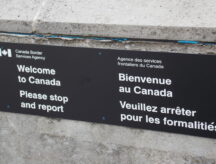Canada to end pre-arrival COVID-19 test for incoming travellers
Starting April 1, fully vaccinated travellers to Canada will no longer need a pre-arrival COVID-19 test.
The Canadian government announced the new measures would affect travellers arriving at all ports of entry. Although pre-arrival testing requirements will be dropped, the government may still randomly test travellers upon arrival. The purpose of the random tests will be to identify and track COVID-19 variants. If fully vaccinated travellers are selected for an on-arrival test, they will not need to quarantine while waiting on their result.
Travel industry advocates in Canada have lobbied against testing requirements, as their price can deter travellers. The Canadian Travel and Tourism Roundtable called the testing requirement a "non-science-based" obstacle. The price of a COVID-19 test can be about $200 CAD for a molecular test, and less than $100 for an antigen test. The group cited the fact that some countries have already dropped their testing requirements, such as the United Kingdom, Denmark, Switzerland and Ireland.
Discover if You Are Eligible for Canadian Immigration
Canada already eased testing requirements on February 28. Currently, travellers to Canada must either produce a pre-arrival antigen test within 24 hours of flight departure or arrival at the land border. The antigen test has to be approved by the country that the traveller is arriving from, and it cannot be done at home. Alternatively, travellers can take a molecular test within 72 hours of coming to Canada. Travellers need to upload documents via the ArriveCAN app before crossing the border.
Also as of February 28, unvaccinated children under age 12 entering Canada no longer have to quarantine for two weeks.
The vaccine mandate for travellers coming to Canada remains in effect. Fully vaccinated approved permanent residents, temporary residents, and visitor visa holders may enter the country. Foreign unvaccinated travellers can only come to Canada in certain circumstances listed on the government's website, such as Ukrainian citizens, temporary foreign workers coming to work in farming or food processing, and people who routinely travel across the border for work, among others. Unvaccinated or partially-vaccinated travellers will still need to be tested on arrival and quarantine for 14 days. They will also need to do a test on day eight of their quarantine.
In order to be considered fully vaccinated, the Canadian government requires travellers to have the full recommended dose of an approved vaccine. At this time, a booster shot is not required. The final dose must have been taken within 14 days of arrival to Canada. Travellers must upload their proof of vaccination to the ArriveCAN app.
Discover if You Are Eligible for Canadian Immigration
© CIC News All Rights Reserved. Visit CanadaVisa.com to discover your Canadian immigration options.
- Do you need Canadian immigration assistance? Contact the Contact Cohen Immigration Law firm by completing our form
- Send us your feedback or your non-legal assistance questions by emailing us at media@canadavisa.com







